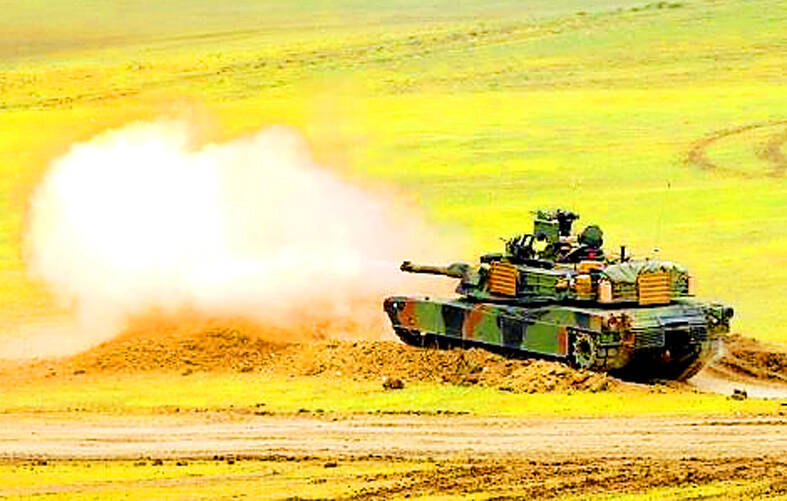The nation’s defense capability is to see a boost over the next four years, as the military is expected to acquire major equipment such as M1A2T tanks, light cruisers and F-16V jets, but production delays are likely to continue posing challenges.
With some analysts saying that Beijing is eyeing an invasion deadline of 2027, Taiwan’s military readiness over the coming years is of critical importance.
Based on the Ministry of National Defense’s published budgets, the military from now until 2027 is scheduled to receive a significant amount of new armaments.

Photo: Reuters
The army is to receive delivery of 108 M1A2T Abrams main battle tanks and 29 M142 High Mobility Artillery Rocket Systems (HIMARS), while the navy is expecting nine more Tuo Chiang-class corvettes, a new type of rescue ship, the domestically developed Hai Kun (海鯤) submarine, two light cruisers and 32 shore-mounted Harpoon missile systems.
In the air force, delivery of 39 more Yung Ying (勇鷹) advanced jet trainers, 66 F-16V Block 70 jets and four MQ-9B drones are expected.
In addition, a special budget implemented from 2022 is providing the funds necessary to acquire missiles and advanced ships by 2026.
This in particular includes the Wan Chien (萬劍) cluster munitions missile optimized for striking enemy airports that is to enter mass production this year, while the Hsiung Sheng (雄昇) surface-to-surface cruise missile and Chien Hsiang (劍翔) drone for countermeasures on land are to be acquired by next year.
However, the acquisition of new equipment has not always been smooth.
Impacts over the past few years from the COVID-19 pandemic and the Russian-Ukraine war have delayed military production capacity across the globe, including that of US equipment already purchased by Taiwan.
For example, the first two of the 66 F-16Vs purchased by Taiwan were scheduled for delivery last year, and all were to be delivered by 2026.
However, the ministry in May last year updated its delivery forecast for the first batch to the third quarter of this year, although it kept the 2026 estimate for completion of the entire order.
As for the four purchased MQ-9B drones, the ministry last year told lawmakers that it hoped for delivery in two batches next year, but revised the estimate to 2027 due to flight testing, training and other factors.
Despite concerns about delays as large shipments of Javelin and TOW anti-tank missiles are being diverted to Ukraine, the ministry’s budget for this year is unchanged from last year.
The army is expecting receipt of 1,240 TOW missiles and 200 Javelin missiles this year, showing that the delivery schedule has not been affected.

AIR SUPPORT: The Ministry of National Defense thanked the US for the delivery, adding that it was an indicator of the White House’s commitment to the Taiwan Relations Act Deputy Minister of National Defense Po Horng-huei (柏鴻輝) and Representative to the US Alexander Yui on Friday attended a delivery ceremony for the first of Taiwan’s long-awaited 66 F-16C/D Block 70 jets at a Lockheed Martin Corp factory in Greenville, South Carolina. “We are so proud to be the global home of the F-16 and to support Taiwan’s air defense capabilities,” US Representative William Timmons wrote on X, alongside a photograph of Taiwanese and US officials at the event. The F-16C/D Block 70 jets Taiwan ordered have the same capabilities as aircraft that had been upgraded to F-16Vs. The batch of Lockheed Martin

GRIDLOCK: The National Fire Agency’s Special Search and Rescue team is on standby to travel to the countries to help out with the rescue effort A powerful earthquake rocked Myanmar and neighboring Thailand yesterday, killing at least three people in Bangkok and burying dozens when a high-rise building under construction collapsed. Footage shared on social media from Myanmar’s second-largest city showed widespread destruction, raising fears that many were trapped under the rubble or killed. The magnitude 7.7 earthquake, with an epicenter near Mandalay in Myanmar, struck at midday and was followed by a strong magnitude 6.4 aftershock. The extent of death, injury and destruction — especially in Myanmar, which is embroiled in a civil war and where information is tightly controlled at the best of times —

China's military today said it began joint army, navy and rocket force exercises around Taiwan to "serve as a stern warning and powerful deterrent against Taiwanese independence," calling President William Lai (賴清德) a "parasite." The exercises come after Lai called Beijing a "foreign hostile force" last month. More than 10 Chinese military ships approached close to Taiwan's 24 nautical mile (44.4km) contiguous zone this morning and Taiwan sent its own warships to respond, two senior Taiwanese officials said. Taiwan has not yet detected any live fire by the Chinese military so far, one of the officials said. The drills took place after US Secretary

THUGGISH BEHAVIOR: Encouraging people to report independence supporters is another intimidation tactic that threatens cross-strait peace, the state department said China setting up an online system for reporting “Taiwanese independence” advocates is an “irresponsible and reprehensible” act, a US government spokesperson said on Friday. “China’s call for private individuals to report on alleged ‘persecution or suppression’ by supposed ‘Taiwan independence henchmen and accomplices’ is irresponsible and reprehensible,” an unnamed US Department of State spokesperson told the Central News Agency in an e-mail. The move is part of Beijing’s “intimidation campaign” against Taiwan and its supporters, and is “threatening free speech around the world, destabilizing the Indo-Pacific region, and deliberately eroding the cross-strait status quo,” the spokesperson said. The Chinese Communist Party’s “threats